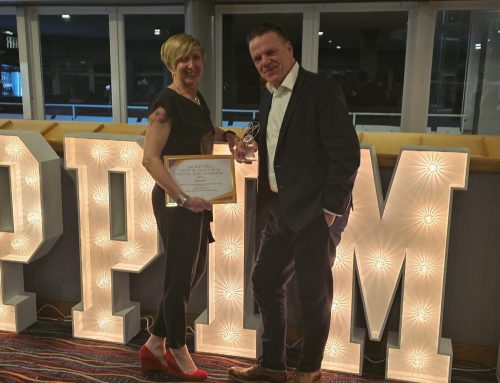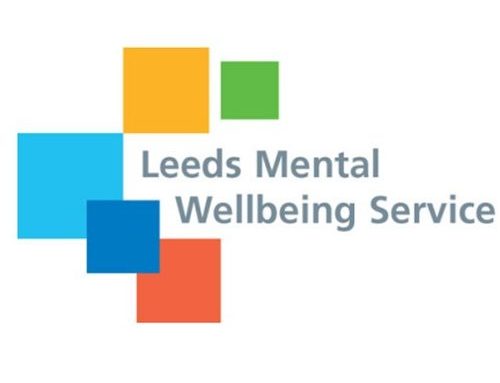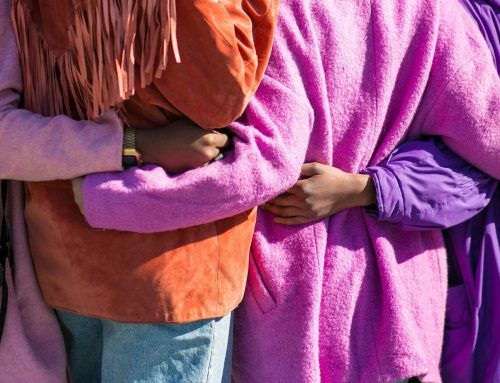Jill Fordham reports on an inspirational Self-Help Programme in the City of Leeds, aimed at empowering sufferers of chronic illness and their carers to live more positive lives.
Some of Positive Care Programme’s service users and therapists
17 million people in the UK suffer with a chronic condition, this comprising by far the biggest group of NHS patients. Most remain entrenched in a dependency culture that benefits neither patient nor provider, but for residents of Leeds, there is a self-management programme that delivers the route for sufferers, towards a more positive and rewarding life.
Founded by Su Mason, 54, in 2004, the Positive Care Programme evolved from a chance meeting between friends around a kitchen table. Based on the premise that people are comprised of body, mind and spirit, and that all aspects require equal attention in order for individuals to live improved and meaningful lives, they set out to identify those components of a more holistic nature that would be helpful for patients with long-term illness. “The attention is given to the physical on diagnosis, but with little to the mind and nothing to the spirit,” says Su, “and whilst there is help with the initial diagnosis of a condition, it’s then a case of here’s your pill and off you go.” Keen to stress that “this was never a one person project at all,” Su then proposed her idea to some therapists, whom she says “have been so wonderful and giving, and without them none of this would have begun.”
The results of a pilot study exceeded all expectations, and so convinced was Su of the programme’s future, that she resigned from her senior post as Joint Head of the Clinical Trials Research Unit at The University of Leeds, in order to commit all her time to the PCP.
During its early years, those involved in delivering the programme gave freely of their time. Essential funding for the building was granted by a fund called MEHMO, which was managed by Leeds based charity Touchstone, an organization still committed to the project, and with an ethos intent on improving health and wellbeing through inspiring communities and transforming lives. An approach was made to local GPs for referrals and with a growing awareness, came support from philanthropic individuals and companies, until three years ago funding awarded by the Big Lottery, made possible the appointment of Hannah Howe, 39, as Positive Care Programme Co-ordinator. Of the programme she tells me “there’s nothing we’re doing that no-one’s never thought of before, but the difference is that unique mix of how we deliver.”
Alexander Technique
Each course is run over a 20 week period, two of which run concurrently at Headingley and at Beeston, thus ensuring fair access to communities both in the north and the south of the city. During this time participants enjoy a choice of complementary therapies, group therapies and motivational workshops. Individual therapies include Indian Head Massage, Reflexology, Acupuncture, Massage, Shiatsu, Emotional Freedom Technique and Healing. Whilst group therapies enable service users to experience the gentle exercise classes of Dru Yoga, Tai Chi and Alexander Technique, to practice the healing art of Meditation or to explore their creative capabilities within an informal class of Therapeutic Art. The workshop titles are diverse and designed to nurture the soul.
Having suffered for many years with ill health, in the form of cancer and chronic back pain, I have more recently suffered two separate falls, on one occasion sustaining a complex spiral fracture to my right hand and on the other, the same to my left leg. The surgery to my hand triggered the onset of the rare and debilitating neurological condition of reflex sympathetic dystrophy and there ensued many months of hospital treatment in order to attempt to reverse the dreadful symptoms of this complex disorder. The most recent fracture to my leg saw me spending four months as a hospital in-patient and a further eight months with my leg in plaster. And it was from this that I was recovering, when my physiotherapist at nearby Chapel Allerton Hospital, suggested that a referral to the PCP might help me further on my way.
Feeling dispirited by a life that had for so long been dictated by medical appointments, I was hesitant at first, in being keen to move on from this monotonous regime. But with the invitation came course information and a sense of privilege that here I was being offered a programme more innovative and without doubt more pleasurable than anything in which I had participated of late.
Indian Head Massage
The individual therapies have been an indulgence to which I have looked forward each week. Acupuncture has promoted pain relief, whilst reflexology has proved a powerful aid to relaxation. Both superseded in terms of bliss ratings by my experience of Indian head massage, which is based on the holistic and traditional Indian medicine of Ayurveda. The practice of healing has proved positive for many, but for me, alarmingly powerful in awakening my energies. And so feeling a little unsettled, I instead took advantage of the flexibility of the Programme, by transferring to something else.
The group therapies of Dru Yoga and Tai Chi have afforded an insight into new forms of spiritual exercise, which together with Meditation, are instigative in healing not only the physical, but also the mental and emotional self. Alexander Technique has proved an excellent education in the importance of good posture, whilst Therapeutic Art as an alternative, has encouraged creativity and with that confidence and hope for those who previously rarely spoke.
The workshop courses have covered a diverse range of topics, presented in both a practical and a theoretical manner. Educational components have included nutritional therapy, delivered alongside practical sessions aimed at developing confidence and lifting your spirits through Giving Voice – all with an emphasis on spiritual exploration and the importance of keeping a calm and resourceful state of mind.
Friends have been made by those previously housebound and conversation has evolved from participants whose lack of confidence prior to the Programme had rendered them mute. Most have enjoyed and advantaged from therapies they’d never considered or which were monetarily out of reach. Able to walk only with a stick at enrolment, I can now manage without, and in balance with that has evolved a mind more focused and enriched with skills that will encourage me to pursue more positive and productive a life.
Ameena’s personal journey has been a tragic and painful one during which she has traversed the world, only to become imprisoned within her own home by the shackles of ill health. Raised inKenya, she returned to her origins inIndiafor a marriage that was cruelly cut short when her husband died in a road accident. Rejected by his family, she returned to Kenya with her young son, but was forced from there as a British citizen, to move to theUK.
The difficulties of settling in a strange city were worsened by her suffering of long-term ill health. Her chronic asthma induced anxiety, which took such a blow when in 1997 she was mugged in the street, that for three years she was unable to leave her bedroom. “I was just too frightened,” she tells me “and my son who was only 13 years old, he cared for me. He gave me my medication and when he came home from school I would open the window and throw the key to him so he could get in.” Diagnosed soon after with a serious heart condition, which has seen her spend many a month in hospital, but with a machine installed in her house to monitor her heart in 2007 and a pacemaker fitted in 2009 she tells me that this made her feel more confident and she became “a little bit more ok.”
Ameena, 54, was referred to the Programme by her support worker, and at the time her thinking was “I’m not sure that I want to join this group. But now I’m thinking that when it’s finished I will miss it. It’s built my confidence coming out and speaking to people and I’ve met some very nice friends. When I come here I meet people, but when I’m in the house I see nobody and there is no talking.” I sense there will be a void for her when it ends, but hopefully she will have gained skills that will assist her in progressing with a more kind and rewarding life.
The ability of some participants, to cope when the course ends, is a concern held by Angela Powell, 79, whose only criticism she says is that “I’ve gone home after the course, with far too much to take in.” Perhaps this is because she is only one of three sufferers in the country with a complex condition so rare that she has much else to contend with herself.
But she is a trooper and soldiers on with a life that since the Programme she says has become a life far more worth living. “I am an absolute mess, but the Programme’s worked for me. It’s woken me up as to how I can help myself. I’ve never been one to open up and tell people about myself, and certainly couldn’t have talked to you like this17 weeks ago. I just get on with things.” And that she does with an admirable determination to help others – serving for 13 years as a Samaritan -as well as herself.
A group artwork produced at the Positive Care Programme
Colin Vella, 31, tells me that he usually copes well with the end of things. “This course has been extremely helpful to me and every day I practice everything I’ve done. I soak it in like a sponge and will take away everything that I’ve learnt. I’ve been inspired by the Art Therapy group to practice art at home and also I enjoy writing. I consider myself to be a very spiritual person with strong beliefs” and it is that which has helped him move on from a very troubled past.
Colin suffers with schizophrenia, as does his partner for whom he cares, who he met at a mental health drop-in. He’d been brought up he says “within a verbally abusive family,” within which he knew nothing “but criticism and disappointment.” This led to a life of drug dependency in which he suffered some dreadful psychotic experiences which culminated in his diagnosis eight years ago, of schizophrenia. “I was at the edge of despair and didn’t trust anyone” he says, and then after his diagnosis he became extremely dependent on alcohol. This he overcame with the help of his GP, during which time he partook in a number of detox programmes, and it was through his GP that he was referred to the programme. “Without the PCP course,” he says, “I could quite possibly have turned back to drink and drugs, but I have not and I thank everybody who’s helped me for that.”
Eveline Burness, 60, joined the Programme three years ago. Her life was in turmoil following the loss of her mother and the breakdown of her 30 year marriage, when one evening as she was walking home from her shift as a housekeeper on a ward at the Infirmary, she was brutally attacked. She suffered fractures to both her arms, her collarbone and several ribs, as her attacker in stealing her handbag dragged her for some distance along the street. Stricken with such cruel misfortune within such a condensed period of time, caused her to fall unsurprisingly into depression.
Encouraged by a friend to attend the Healing Centre at Centenary House, she met Su, who invited her to join the Programme. Although hesitant at first, she went, and of the PCP she tells me “It was lovely. I made some long lasting friendships and the therapies made me feel much better, and you got such a lovely welcome when you walked through the door. By the time it had finished I didn’t want to leave it and wanted to be involved, and so decided to do a course on healing.” The course took twelve months, since when she has almost completed a further two year probationary period and will in two months be assessed by a panel, after which she hopes to qualify. She is still in pain, but this she has learnt to manage, along with the many other skills that the Programme has taught her in order to best improve her quality of life.
In September the Big Lottery funding comes to an end, but they have been here before I am told, and are optimistic of a reprieve, for after all positivity is the ethos in which they believe.





